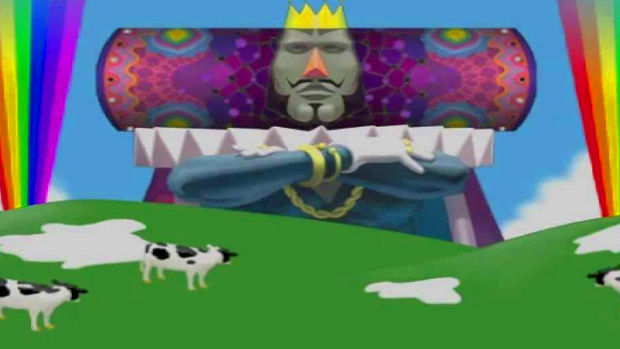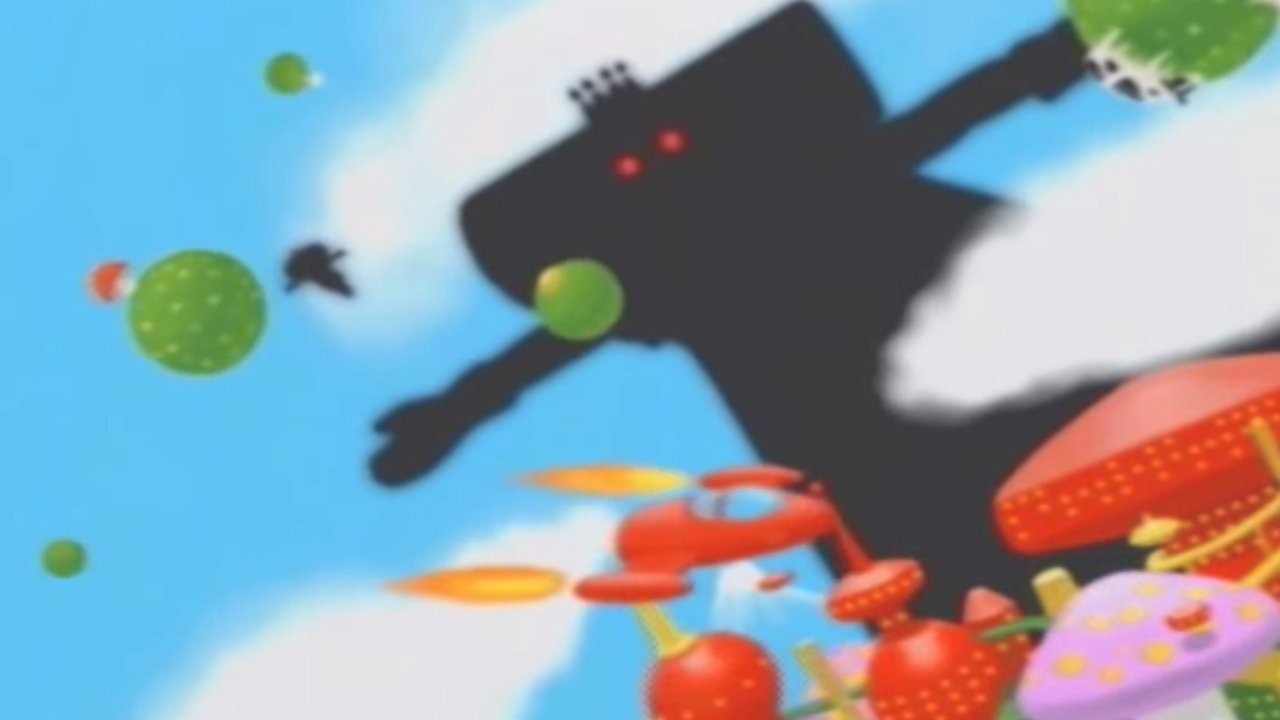Why I Love: Katamari Damacy's King of All Cosmos

I can't think of a single video game character who's quite like the King of All Cosmos. And that's not even taking into account his physical appearance: an impossibly colossal, regal father figure, with a head shaped like a rolled-up yoga mat and a crotch bulge rivaled only by David Bowie in Labyrinth (RIP). It's more the fact that he's such a strange, complex figure in a relatively simple series of games about rolling objects up into a gigantic ball. The King is somehow your main benefactor and primary antagonist at the same time, on top of being the classic archetype of the impossible-to-impress dad. My parents will probably read this at some point, so I won't say I can relate, but... I can kind of relate.
Were it not for the King, the main crisis of Katamari Damacy would never have come to pass. It's his fault the sky is devoid of stars, after he smashed them to smithereens while under the influence of pure irresponsible whimsy. He's ostensibly got the same powers as God, and could probably summon those stars back into existence with a thought. Instead, he dumps the problem on you, the diminutive Prince who's somehow able to keep a smile throughout all this paternal abuse. Before, during, and after each stage, he talks your ear off with staccato musings about constellations and the things that make life worth living. According to the King, he and your mother keep buying you presents, but oops, he lost them all. If you want them, you better go find them yourself, you loser Prince (something he actually calls you at one point, along with a whole catalogue of digs at your diminutive stature).
And yet, for all his disapproving tones, he has a way of making you feel wonderful for your exceptional accomplishments. It's all tied to how quickly you meet a level's Katamari size quota, and how large you finally roll it up to be within the total time allotted. Tap out right after hitting the goal, and the King will probably chastise you, saying "It's OK, but you can do better. Well, since you're the Prince, you should do much, much better." But ace a stage, and he'll delight you with praise like "You hit the goal awfully fast. That was fantastic. That was so speedy and so smart. It will be a shooting star like BOOOM!" His phrasing can either validate or devastate your efforts, and I was legitimately tense after each stage in the hopes that I would earn his approval.
On top of his distinct demeanor, the King's design is full of little, wonderfully odd touches. He's the only speaking character in the original game, if you exclude the panicked screams of Japanese citizens being rolled up into a giant ball of stuff - and yet, his dialogue is conveyed entirely through record scratches of various tempos. Slow indicates disapproval or deep thoughts; fast clearly conveys urgency and excitement. At the end of each level, the King's disembodied head appears to barf out a Royal Rainbow, warping you and your Katamari back into space. Before each mission to remake a star, he greets you in a variety of different languages, recommending that you visit before deciding nah, you're much too busy cleaning up his mess.

I've only ever played the original Katamari Damacy, but later games maintain his imposing flamboyance and give his character even more bizarre backstory. The King of All Cosmos is like the prototype for GLaDOS: the silent hero's ominous, eminently quotable foil, who's somehow lovable despite the fact that they're constantly berating you. I let out a yelp of laughter when I saw the shot above, taken from the ending cutscene. In the light, the King appears to be a giant, foppish softy - but that terrifying, red-eyed silhouette shows him for what he truly is: an all-powerful being who could obliterate all of existence on a whim. Like the series that spawned him, the King of All Cosmos really is one of a kind.
Weekly digests, tales from the communities you love, and more
Lucas Sullivan is the former US Managing Editor of GamesRadar+. Lucas spent seven years working for GR, starting as an Associate Editor in 2012 before climbing the ranks. He left us in 2019 to pursue a career path on the other side of the fence, joining 2K Games as a Global Content Manager. Lucas doesn't get to write about games like Borderlands and Mafia anymore, but he does get to help make and market them.



